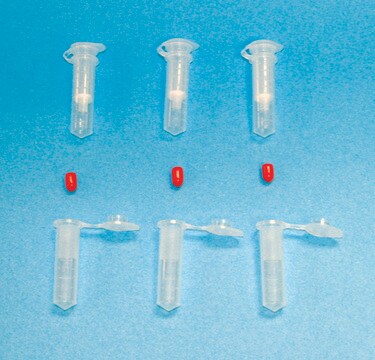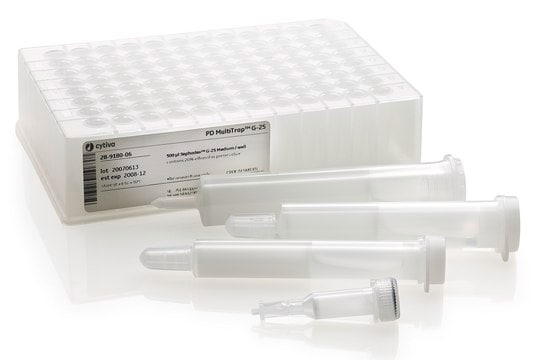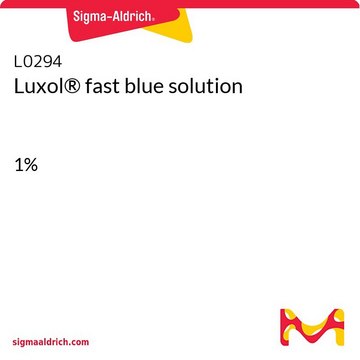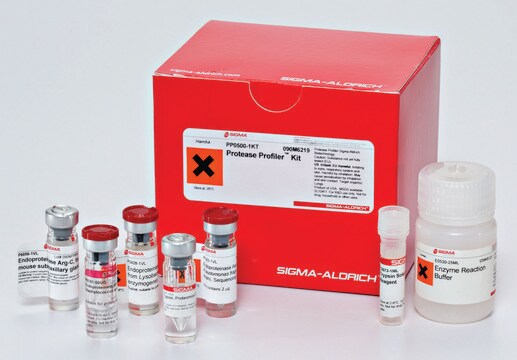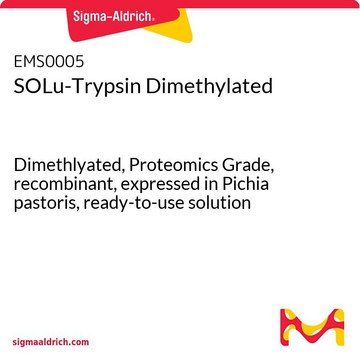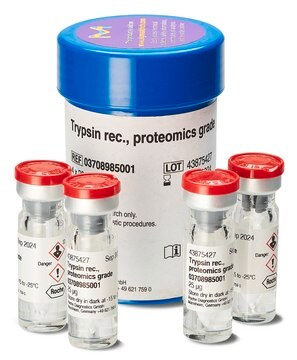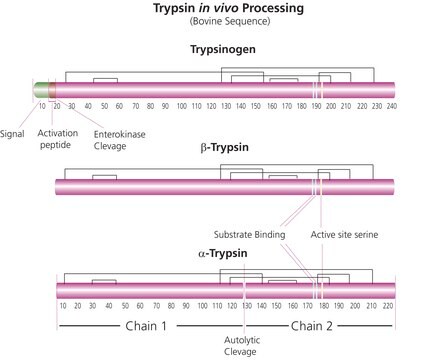Wszystkie zdjęcia(1)
Key Documents
TT0010
Trypsin Spin Columns
for proteomics
Synonim(y):
Immobilized TPCK- treated Trypsin, Immobilized Trypsin
Zaloguj sięWyświetlanie cen organizacyjnych i kontraktowych
About This Item
Kod UNSPSC:
12352200
NACRES:
NA.56
Polecane produkty
Szukasz podobnych produktów? Odwiedź Przewodnik dotyczący porównywania produktów
Powiązane kategorie
Opis ogólny
Enjoy all of the advantages of Proteomics Grade Trypsin in a 15-minute digestion. A staple of MS sample preparation, efficient tryptic digestion is essential to successful proteomic analyses. While traditional digests require up to 18 hours, the same digest can be accomplished in only 15 minutes using the Trypsin Spin Column, Proteomics Grade.
This ultra-micro spin column contains highly purified, TPCK-treated porcine trypsin immobilized on a spherical 20 micron silica support, chemically modified to minimize non-specific adsorption. This product is ideal for rapid protein digestion of small volumes (100 μl or less). Eluted peptides are ready for MS analysis, and require no additional clean-up.
This ultra-micro spin column contains highly purified, TPCK-treated porcine trypsin immobilized on a spherical 20 micron silica support, chemically modified to minimize non-specific adsorption. This product is ideal for rapid protein digestion of small volumes (100 μl or less). Eluted peptides are ready for MS analysis, and require no additional clean-up.
Cechy i korzyści
Discover the advantages for yourself!
- 15 minute digestion
- Ideal for 10 to 100 μg of protein sample
- Minimal chymotryptic activity
- No additional clean-up required
This page may contain text that has been machine translated.
produkt powiązany
Numer produktu
Opis
Cennik
Hasło ostrzegawcze
Warning
Zwroty wskazujące rodzaj zagrożenia
Zwroty wskazujące środki ostrożności
Klasyfikacja zagrożeń
Acute Tox. 4 Oral
Kod klasy składowania
10 - Combustible liquids
Temperatura zapłonu (°F)
Not applicable
Temperatura zapłonu (°C)
Not applicable
Certyfikaty analizy (CoA)
Poszukaj Certyfikaty analizy (CoA), wpisując numer partii/serii produktów. Numery serii i partii można znaleźć na etykiecie produktu po słowach „seria” lub „partia”.
Masz już ten produkt?
Dokumenty związane z niedawno zakupionymi produktami zostały zamieszczone w Bibliotece dokumentów.
Klienci oglądali również te produkty
Logan J Everett et al.
Journal of proteome research, 9(2), 700-707 (2009-12-02)
"Multi-stage" search strategies have become widely accepted for peptide identification and are implemented in a number of available software packages. We describe limitations of these strategies for validation and decoy-based statistical analyses and demonstrate these limitations using a set of
Julianne Backiel et al.
Biochemistry, 47(43), 11273-11284 (2008-10-04)
Enzymes of the Rnf family are believed to be bacterial redox-driven ion pumps, coupling an oxidoreduction process to the translocation of Na+ across the cell membrane. Here we show for the first time that Rnf is a flavoprotein, with FMN
Hans W Hahn et al.
Journal of proteome research, 8(9), 4225-4230 (2009-07-31)
Trypsin was immobilized on glycidylmethacrylate-co-divinylbenzene (GMA/DVB) polymerized in pipet tips for online enzymatic digestion of proteins. The major advantages of in-tip digestion are easy handling and small sample amount required for analysis. Microwave-assisted digestion was applied for highly efficient and
Tomoharu Takeuchi et al.
Biological & pharmaceutical bulletin, 34(7), 1139-1142 (2011-07-02)
To study the endogenous counterpart of LEC-6, a major galectin in Caenorhabditis elegans, the proteomic analysis of glycoproteins captured by an immobilized LEC-6 column was performed using the nano liquid chromatography-tandem mass spectrometry (LC-MS/MS) technique. A protein recovered in a
Shama P Mirza et al.
Journal of proteome research, 7(7), 3042-3048 (2008-05-31)
Proteomics-based quantification methods for differential protein expression measurements are among the most important and challenging techniques in the field of mass spectrometry. Though numerous quantification methods have been established, no method meets all the demands for measuring accurate protein expression
Nasz zespół naukowców ma doświadczenie we wszystkich obszarach badań, w tym w naukach przyrodniczych, materiałoznawstwie, syntezie chemicznej, chromatografii, analityce i wielu innych dziedzinach.
Skontaktuj się z zespołem ds. pomocy technicznej